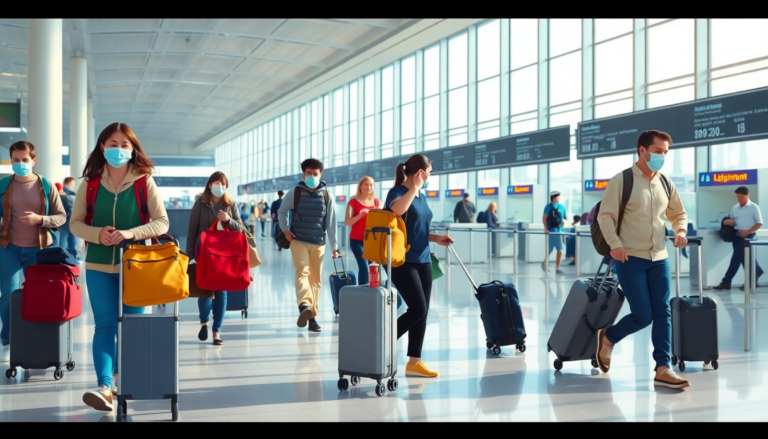Argomenti trattati
Traveling opens up a world of experiences, but it also brings certain health risks that shouldn’t be overlooked. One such concern is measles, a highly contagious viral infection that can spread rapidly, especially in crowded places like airports and public transport. Understanding how measles is transmitted and learning how to protect yourself is crucial for anyone planning to travel, whether domestically or internationally.
How measles spreads
Measles is primarily transmitted through respiratory droplets when an infected person coughs or sneezes. Remarkably, the virus can linger in the air for up to two hours after the infected individual has left the area, making it easy for others to become infected. If someone breathes in this contaminated air or touches a surface where the virus has settled, they can contract the disease. This means that travelers should be particularly cautious in environments where people congregate, such as tourist attractions, public transport, and busy airports. It’s worth noting that infected individuals can spread the virus four days before and four days after the appearance of the characteristic rash, which adds an additional layer of risk.
Symptoms and complications
The symptoms of measles typically begin with a high fever, followed by a distinctive red, bumpy rash. Other common signs include a cough, runny nose, and red, watery eyes. While measles can affect anyone, it can lead to severe complications, particularly in vulnerable populations. Pneumonia, encephalitis, and even death can occur, especially among children under five, adults over twenty, pregnant women, and those with weakened immune systems, such as individuals living with HIV or leukemia. More frequent complications include ear infections and diarrhea, which can be distressing and lead to further health issues.
Vaccination recommendations for travelers
The Centers for Disease Control and Prevention (CDC) strongly recommends that all travelers be fully vaccinated against measles before embarking on any international journey. The best way to ensure protection is by receiving two doses of a measles-containing vaccine. Infants aged 6 to 11 months traveling internationally are advised to get one dose of the MMR vaccine at least two weeks before departure. For those who have already received one dose before their first birthday, it is essential to follow the regular immunization schedule, which includes another dose between 12-15 months and a final booster at 4-6 years of age.
Who should get vaccinated?
For individuals aged 12 months and older, it’s recommended to receive two doses of the MMR vaccine, spaced at least 28 days apart, prior to international travel. If a child has received the measles-mumps-rubella-varicella (MMRV) vaccine, they can still receive an MMR dose after the appropriate waiting period. However, a subsequent MMRV dose cannot be administered until three months have passed since the last MMRV dose. If you or your travel companions are uncertain about your vaccination status, scheduling an appointment with a healthcare provider at least six weeks before traveling is advisable. This ensures sufficient time for vaccinations and any follow-up doses that may be needed.
Considerations for those unable to vaccinate
Some individuals may not be able to receive a measles-containing vaccine due to medical reasons. In such cases, it’s crucial to discuss potential travel plans with a healthcare provider to assess the risks. Postponing travel may be the most prudent option for those who cannot safely receive the vaccine. If you believe you have been exposed to measles or are experiencing symptoms, it’s important to seek medical attention promptly. A self-reported history of vaccination or previous infection is not considered adequate evidence of immunity, making it essential for travelers to have proper documentation of their vaccination status.
Final thoughts
Traveling can be one of life’s most enriching experiences, but it also requires careful planning, especially regarding health precautions. Measles remains a global concern, with outbreaks occurring in various regions. By staying informed about the risks and ensuring proper vaccinations, travelers can protect themselves and those around them, making their journeys safer and more enjoyable. Before you set off on your next adventure, take a moment to review your vaccination records and make any necessary appointments. Remember, being prepared is key to a successful and healthy trip.

